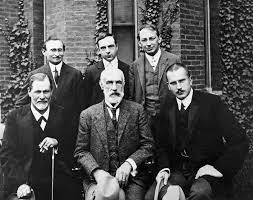WEIRD
Once upon a time, during the the early days of modern psychology, in an attempt to describe the normal human psyche, by which I mean : how the average person interacts with the world – psychologists produced what appeared to be a pretty excellent, tentative model : Humans tended to have a strong work ethic, were analytical, trusting and cooperative with strangers, but also paradoxically individualistic and self obsessed.
This model was produced thanks to research that was carried out during the 1900’s in the Universities of North America and Europe.

Unfortunately, when postgraduate anthropologists later ventured out into the rest of the world, with this understanding of the human psyche, the model fell apart.
Faced with a Lakota Indian, a Saami tribesman or a Tuareg, our intrepid postgraduate was unable to check the boxes in their trusty notepad. The Human psyche could apparently not be categorised into one tidy box.
The analytical, cooperative, trusting and self-obsessed mind that psychologists were studying and describing, had been based on a tiny sample group, namely : volunteer university undergraduates.
Even if other volunteer subjects were found via the small ads section of the local newspaper, they were all part of a population we now identify as : Western Educated Industrialised Rich & Democratic (WEIRD).
Our WEIRD mind might seem familiar to us – and it is of course being produced all over the world (not just in Europe, Australia & North America) most notably in the schools and universities of Singapore, Korea, Japan & Israel. It is still a rarity though.
In terms of Geography, we could say that over 50% of the planet’s landmass falls outside the regions stated above.
In terms of demographics : Europe, Australia & N. America only make up about 20% of the world population – and the part of that population with university education, makes up an even tinier figure.
In terms of temporality, universities have only existed for less than 1% of humanity’s existence. (The Universities of Bologna, Paris & Oxford being considered the first three – all founded between 1088 and 1167).
Clan Based psyche
What we (meaning anthropologists, psychologists, sociologists) have been discovering in the field, when interacting with tribal cultures, is that most people relate to the world in exactly the opposite way to us WEIRDo’s.

Wherever we might be predominantly analytical, the vast majority of people are, shall we say : synthetic – they say what they see. For example, when sorting stuff into categories, they don’t first divide phenomena up and then sort them into homogenous bundles, based on, for example, genus or type. They tend instead to group stuff together based on how things interact according to their everyday experience.
We might bundle together cows, horses & rabbits in one group, and carrots, grass and grains in another. In other words : mammals in one batch, and vegetables in the other. A more traditional subdivision would be to put cows and grass in a group, or rabbits and carrots. In other words, real life pairings.
WEIRDos like us also tend to be able to place our confidence in both random strangers and institutions. And we are able to do so despite never having even met them or interacted with them before. I, for example, will pay good money to some online company or government office, quite sure that they will do whatever they promised. I wouldn’t be that surprised if some stranger handed me the wallet that they had just seen me drop. If a group of unknown astronomers told us Pluto was no longer a planet, I’d say : OK.
In traditional societies, you would also come to the aid of someone who had dropped their stuff, but you would do so mainly because everyone you interact with, on the street, in your village, is probably your auntie, uncle or cousin. You have responsibilities to the people in your community, because they are your kin. If you did come across some unaccompanied stranger wandering around on your turf, it would be a rare day indeed – and if your status permitted, which in many cases means : if you were a young adult male – you would accost them and investigate the intrusion.
Trust and cooperation is a question of clan or family obligation.
The same goes for truth and knowledge. This is passed down as part of the family tradition, or pronounced by the head (usually patriarchal) of the clan.
Apart from these differences in trust and reasoning, other quirky personality traits where we differ from the rest of humanity have to do with notions of self-reproach and motivation.
For example, in terms of feeling bad about something we’ve done. Our sense of self-recrimination is usually based on the idea of guilt. Someone from a more traditional, clan based society, would be more inclined to suffer from shame.
The difference being that I am capable of feeling guilty for breaking some commonly recognised rule, like lying, cheating or general incompetence, even if no one else was aware of my actions. Maybe I kicked my cat in a fit of rage (I didn’t really, just a hypothetical). Chances are, I would feel pretty bad about myself as a person – even if I never told anyone about it.
Shame on the other hand, in its traditional sense, has more to do with perceived failures in relational, clan based obligations. Not only is shame dependent on the opinion of other people, it is also not merely a purely personal fault, but ultimately stigmatises your whole family.
We can take the example of theft, which is a fault within many societies. From the honour/shame based perspective, stealing is only bad if the victim belongs to your clan. Because the real crime is the betrayal of one’s in-group. National laws, if they exist in your country, would come second only to the public honour of your clan.
In communities where the concept of personal property is a bit fuzzy, stealing from your brother might be meaningless – everything belonging to the collective – and stealing from a rival group could be a positive accomplishment.
Similar psychological processes are at work when it comes to ambition or motivation.
If a WEIRDo’s success is something personal, which could be based on accomplishments in their profession, or educational status. Success in a kin based society, would again be based on how well you are upholding or accumulating honour and power for the collective.
This is achieved via protecting our symbolic capital (which belongs ultimately to the head of the clan) – For example, through marriage to the right people – which may secure more honour if done correctly, and is also a strategy for inheritance preservation. Defence of one’s honour may of course, include attack, sometimes with direct violence towards internal or external (to the clan) offenders.
Of course, even the best WEIRDos are prone to feeling some of these traditional mindstates. Shame and feelings of bro-ness (or kinship) are mental processes that run deep, forged by evolution over thousands of years. Our chimpanzee cousins probably feel something similar. However, if we find out that our best buddy has committed some atrocious act, we will have a tendency to place the law of the land, or the wellbeing of society as a whole, above our personal relationship.
The same goes for people from more traditional cultures, the modern mindset may well have permeated their personality to some degree. Maybe because they have immigrated to the West, or graduated from university, for example.
And as we have learnt in this so-called “post truth” world, just because you happen to be a blond, blue eyed westerner, does not mean you necessarily value facts over tribal dogma, or trust science.

Anyway, the exciting news is that we’ve got a pretty solid theory (thanks to Joseph Henrich) of why this is. A theory that explains how the scientific method emerged in the human mind (Waouh!). Or how we came to trust each other, and why we now place our faith in rationality over belief.

